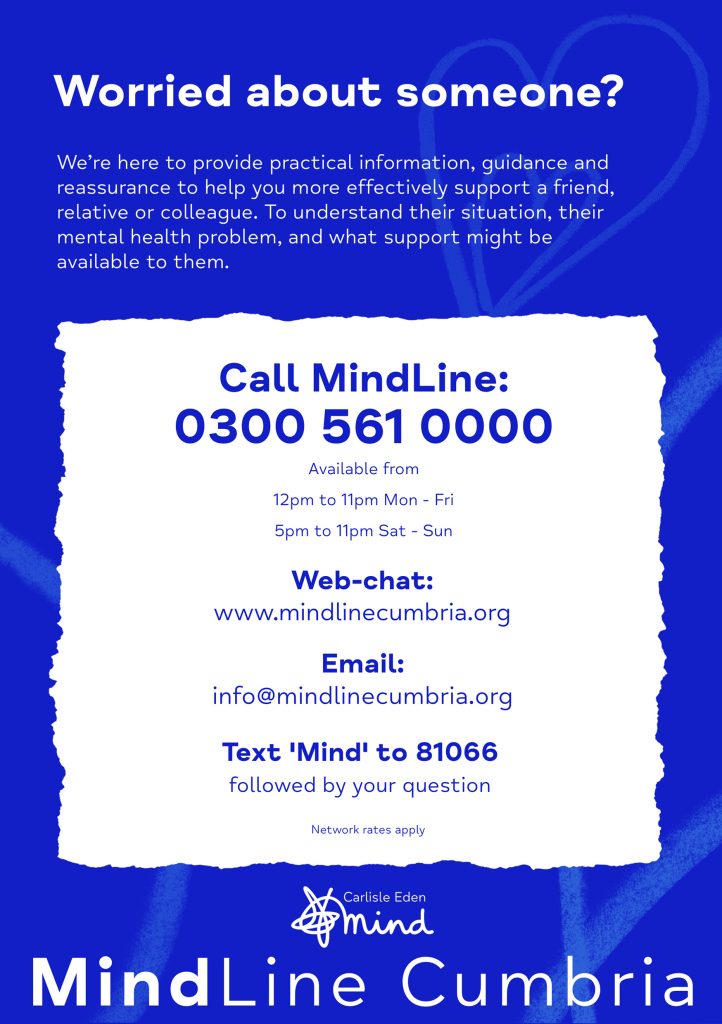*Views expressed in this blog are my own and not Carlisle Eden Minds
Killing oneself is anyway a misnomer. We don’t kill ourselves. We are simply defeated by the long hard struggle to stay alive. Sally Brampton
Sally wrote “Shoot the damn dog”, the founding editor of Elle magazine in the UK. After battling depression for years, took her life in 2016. The inquest concluded health professionals “missed opportunities” to offer her help. When the NHS Mental Health system fractures, cracks appear. Those that are seeking Mental Health help, fall through the safety net. But when these cracks open, sunshine is let out. The statutory service that fill those cracks, are the police. It has always been an essential part of their service.
Suffering is everywhere in the world. Poverty, unemployment, discrimination, social injustice. We all, from time to time, experience suffering. Will global suffering ever end or is it hard wired into the human condition ? There is a thin thread connecting suffering to depression and suicide. The thread is mostly invisible. To make it visible, I feel we need in our society, an arms reach “action approach” to suicide.
This my first blog for Carlisle Eden Mind. I am one of the trainers in our Mental Health services. I remember at the age of 11, sitting on the toilet, when a thought popped up. It filled me with dread. The thought was: one day I will die, it will be permanent, I will cease to exist. I just sat there, looking around the bathroom. Up to that point in my life, I had no conception of death. Now, I felt there was nothing I could do to stop my death, I felt utterly helpless. My excitement to live my life into the unknown future, just for a moment, disappeared, I felt hopeless.
In 1977, I joined Springfield Hospital in Tooting, London, as a student psychiatric nurse. Throughout the four years there, I was shocked at suffering of those that had been forced to make their home there. No one had the dignity of ordinary paid work, pocket money of a few pence, I saw some of my work colleagues treat “patients” as subhuman, I felt a huge sense of social injustice.
My last professional nurse role was the two years, I worked at the locked ward: Intensive Care Unit at the Maudsley Hospital, in South London. Most of my time was in nurse observation. For those who were at high risk of ending their lives, the doctors prescribed “arms reach” nursing observation. This meant being so close to the person all the time, if I reached out my arm, it would touch their body. Even in such a tightly controlled environment, the ward was not always safe.
Turning the corner to the ward toilet, there in front of me was a person hanging from a noose they had secretly made. I physically lifted the person, until other staff came. When talking to that person later that week, I was struck by the sense of utter hopelessness and helpless, they felt at the time. These two feelings was what Sally Brampton experienced. It was why she wanted to walk into the sea.
The Royal Assent to the Suicide Bill was given at 6.31 PM on 3 August, 1961. It decriminalised the act of suicide in the UK, removing the powers of the police to prosecute a person, if they attempted to take their life. The proposed Act was engineered by the Labour MP Derek Robinson, quietly taken through the various legislative stages by the senior conservative MP Rab Butler. It was hardly debated in the House of Commons, passing into legislation without much public attention. It was too sensitive a subject to be debated in and outside of parliament, at the time.
Chad Varah, founder of the Samaritans, objected to the proposed Act. He knew that if the police discovered a person who had tried to take their life but not died, they had the legal power to force that person to appear before a court. His experience the magistrates would typically say “you need psychiatric help because you tried to end your life. If you refuse, you go to prison or accept the offer of psychiatric help, which I urge you to take”. Chad knew that for London magistrates, jail was the worst place to end up in but that power helped those intent on suicide choose seeking help. Doris Odlin, a psychiatrist who worked with Derek Robinson, challenged Chad in a conversation with him. Magistrates outside of London were different, her experience was they wanted to punish those that tried to take their life. It was this argument that persuaded Chad to change his mind.
The police historically, have been always been the Mental Health service of last resort. Going right back to the eighteenth century, every parish constable who found a person wandering in a public place, who appeared to be experiencing suffering, had the power to immediately apprehend the person and take them before a Justice. The 999 service and the 136 place of safety section, continues that tradition.
Poorly circulating black bile was originally thought to be the cause of melancholia (depression). Another cause was “acedia”. If you were exposed to long periods of isolation, the noonday demon of acedia would press down on you. “Pressing down” is an ancient way of describing depression. More recently, from the 1960’s onwards, that “pressing down” came to be understood by how our human society treated you. For example: 1n the 1970’s, women who were denied the freedom to work, lived with a partner whom it was not safe to confide in and looked after three or more very young children, were found to be more vulnerable to depression. Social suffering is beginning to be linked (the thread), more directly to depression.
When life becomes meaningless, feelings of suicide fills the hole created by the belief that hope has permanently gone. Who do you turn to ? The police. How do you do this ? Dial 999. You know that they will respond. No matter what. Cops want to help people, Cops want to find a solution. But are the police’s core Mental Health function fundamentally changing ? I believe they are. They are overwhelmed with the sheer number of responsibilities loaded into their police JD. Some things will need to be less of a priority, one is the future likelihood to not always physically respond to Mental Health 999 calls.
Suicide prevention 2023 theme is “Creating Hope Through Action”. Imagine the police have changed. When you dial 999, there is no answer, you dial again, you are told if you phone again, you block a line for the real purpose of 999, you will be prosecuted for wasting the police time and sent to jail. “stop it”. That’s not going to happen, is it ?
In the end, I am reminded that the “within arms reach” nursing observation was the ultimate place of safety.
Imagine a UK society, where everyone has a treasured circle of friends. They know each other intimately, they are there for each other. All understand suicide deeply, it can happen to anyone. It does not matter if it is at 3 am in the morning. They accept that any one of their friends, whose suffering has been nearby, has now descended: pressing down hard. They are all, a text or whatsApp message away. You feel your friends are an “arms reach” away. That’s not going to happen either.
Or is it ?
Written by Chris Graham (CE Mind Trainer)

What if its an emergency?
There may be times when your friend or a family member needs to seek help more urgently, such as if they:
- have harmed themselves and need medical attention
- are having suicidal feelings, and feel they may act on them
- are putting themselves or someone else at immediate, serious risk of harm.
In this case:
If they are not safe by themselves right now – as long as you feel able to do so, you should stay with them and help them call 999 for an ambulance, or help them get to A&E. They may appreciate it if you can wait with them until they can see a doctor.
If they can keep themselves safe for a little while – you can get quick medical advice by calling NHS Direct on 111 (England) or 0845 46 47 (Wales), or you could help them make an emergency GP appointment to see a doctor soon. You can encourage them to call the Samaritans on 116 123 at any time of night or day to talk to someone. It may also be helpful to remove things that they could use to harm themselves, particularly if they have mentioned specific things they might use.
If you feel personally in danger right now, or that others are in immediate danger – you can dial 999 and ask for the police to help. You might feel worried about getting someone in trouble, but it’s important to put your own safety first

















